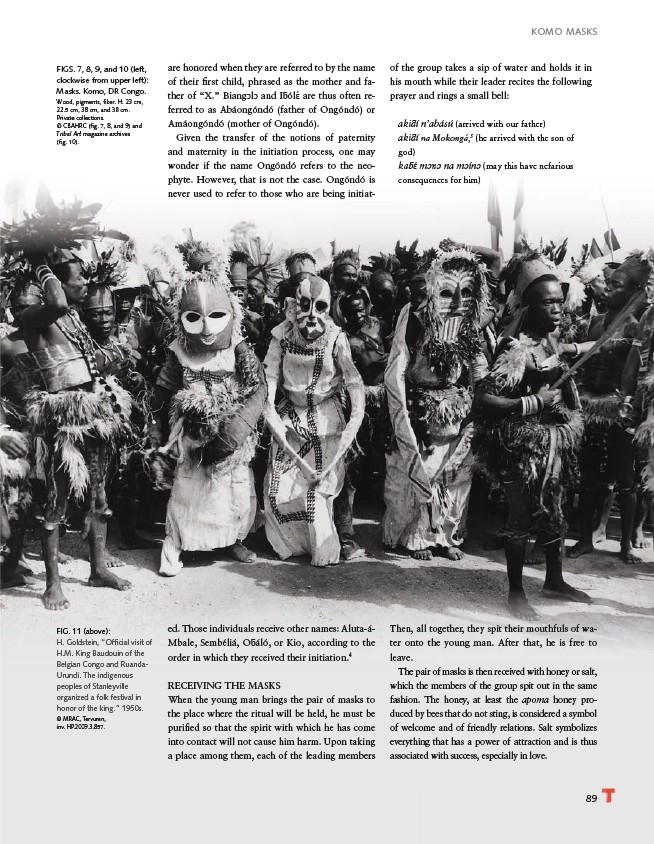
Then, all together, they spit their mouthfuls of water
onto the young man. After that, he is free to
leave.
The pair of masks is then received with honey or salt,
which the members of the group spit out in the same
fashion. The honey, at least the apoma honey produced
by bees that do not sting, is considered a symbol
of welcome and of friendly relations. Salt symbolizes
everything that has a power of attraction and is thus
associated with success, especially in love.
89
ed. Those individuals receive other names: Aluta-á-
Mbale, Sembéliá, Oƃáló, or Kio, according to the
order in which they received their initiation.4
RECEIVING THE MASKS
When the young man brings the pair of masks to
the place where the ritual will be held, he must be
purifi ed so that the spirit with which he has come
into contact will not cause him harm. Upon taking
a place among them, each of the leading members
of the group takes a sip of water and holds it in
his mouth while their leader recites the following
prayer and rings a small bell:
akiƌí n’abású (arrived with our father)
akiƌí na Mokongá,5 (he arrived with the son of
god)
kaƃέ mɔnɔ na mɔínɔ (may this have nefarious
consequences for him)
FIGS. 7, 8, 9, and 10 (left,
clockwise from upper left):
Masks. Komo, DR Congo.
Wood, pigments, fi ber. H: 23 cm,
22.5 cm, 38 cm, and 38 cm.
Private collections.
© CBAHRC (fi g. 7, 8, and 9) and
Tribal Art magazine archives
(fi g. 10).
FIG. 11 (above):
H. Goldstein, “Offi cial visit of
H.M. King Baudouin of the
Belgian Congo and Ruanda-
Urundi. The indigenous
peoples of Stanleyville
organized a folk festival in
honor of the king.” 1950s.
© MRAC, Tervuren,
inv. HP.2009.3.857.
KOMO MASKS
are honored when they are referred to by the name
of their fi rst child, phrased as the mother and father
of “X.” Biangɔlɔ and Iƃólέ are thus often referred
to as Abáongóndó (father of Ongóndó) or
Amáongóndó (mother of Ongóndó).
Given the transfer of the notions of paternity
and maternity in the initiation process, one may
wonder if the name Ongóndó refers to the neophyte.
However, that is not the case. Ongóndó is
never used to refer to those who are being initiat-